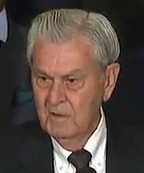David Glass (businessman)
| David Glass | |
|---|---|

Glass in 2015
|
|
| Born |
David Dayne Glass September 2, 1935 Oregon County, Missouri |
| Nationality | American |
| Alma mater | Missouri State University (B.S.) |
| Occupation | Businessman |
| Employer | Wal-Mart Stores, Inc., Kansas City Royals |
| Predecessor | Sam Walton |
| Successor | H. Lee Scott |
| Board member of | Wal-Mart, Kansas City Royals |
| Spouse(s) | Ruth Glass |
| Children | 3 |
David Dayne Glass (born September 2, 1935) is the former president and chief executive officer of Wal-Mart Stores, Inc. He is the owner and chief executive officer of the Kansas City Royals.
David Glass joined the company in 1976. In his position as Executive Vice President of Finance for Wal-Mart Stores, he administered the overall financial and accounting responsibilities of the company prior to his appointment as vice chairman and chief financial officer. He served in that role until 1984 when he was named president and Wal-Mart’s chief operating officer. Along with Rob Walton, in 1985 Glass managed development of Retail Link program, Walmart's proprietary trend-forecasting software. In 1988 he was named Wal-Mart’s chief executive officer, stepping down from the position in January 2000. Glass was active in the company's growth from 123 stores in 1976 to its more than 4,000 nationally and internationally in 2005.
Glass was named Retailer of the Year by members of the retail industry in 1986 and 1991 and was inducted into the Retail Hall of Fame in August 2000. Glass has been a member of the board of Wal-Mart Stores, Inc. since 1977.
Glass became the interim CEO and chairman of the Royals on September 23, 1993, following the death of the founding owner, Ewing Kauffman. Under Glass' leadership, the board cut the payroll from $41 million to $19 million. During the Major League Baseball strike of 1994–1995, Glass opposed any settlement with the players' union without a salary cap, and supported the use of strike-breaking "replacement" players, despite a court ruling that the use of replacement players violated federal labor law.
On April 18, 2000, Glass became sole owner of the Royals, purchasing the organization from the Kauffman estate for $96 million. The Royals board approved his offer despite a competing bid of $120 million by Miles Prentice. However, MLB rejected Prentice's offer because he didn't have enough net worth to withstand substantial losses. With none of the area's wealthy families willing to even consider making a bid for the Royals—or any other existing or prospective professional team in Kansas City—Glass was the only credible bidder who was interested in keeping the team in town. An original stipulation of the sale was that any profits from Glass' sale of the Royals must go to charity, but that clause has since expired.
...
Wikipedia
